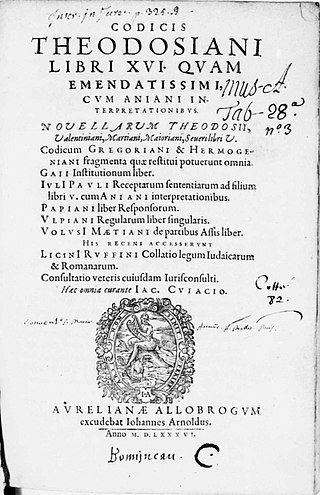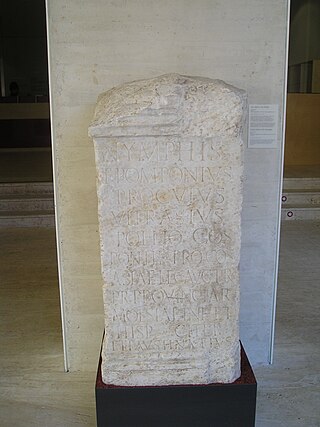Related Research Articles

Marcus Aurelius Antoninus was Roman emperor from 161 to 180 AD and a Stoic philosopher. He was the last of the rulers known, noncontemporaneously, as the Five Good Emperors and the last emperor of the Pax Romana, an age of relative peace, calmness and stability for the Roman Empire lasting from 27 BC to 180 AD. He served as Roman consul in 140, 145, and 161.

Lucius Aurelius Verus was Roman emperor from 161 until his death in 169, alongside his adoptive brother Marcus Aurelius. He was a member of the Nerva-Antonine dynasty. Verus' succession together with Marcus Aurelius marked the first time that the Roman Empire was ruled by more than one emperor simultaneously, an increasingly common occurrence in the later history of the Empire.
Gaius Avidius Cassius was a Syrian Roman general and usurper. He was born in Cyrrhus, and was the son of Gaius Avidius Heliodorus, who served as praefectus or governor of Roman Egypt, and Julia Cassia Alexandra, who was related to a number of royal figures, including her descent from both Augustus and Herod the Great. He began his military career under Antoninus Pius, rising to the status of legatus legionis. He served during the Parthian war of Lucius Verus, in which he distinguished himself, for which he was elevated to the Senate, and later made Imperial legate. During the Bucolic War, he was given the extraordinary title of Rector Orientis, giving him Imperium over all of the eastern provinces of the Roman Empire.
Marcus Statius Priscus Licinius Italicus was a Roman senator and general active during the reigns of Hadrian, Antoninus Pius, and Marcus Aurelius. Contemporary sources refer to him as Marcus Statius Priscus or simply Statius Priscus. He was consul for the year 159 as the colleague of Plautius Quintillus; Priscus was one of only two homines novi to attain the ordinary consul in the reigns of Antoninus Pius and Marcus Aurelius.

Lucius Volusius Maecianus was a Roman jurist, who advised the Emperor Antoninus Pius on legal matters, as well educating his son the future Marcus Aurelius in the subject. Originally of the equestrian class, Maecianus held a series of imperial offices culminating with prefect of Egypt in 161, when Marcus Aurelius adlected him inter praetorios, or with the rank of praetor, into the Roman Senate. Maecianus was suffect consul in an undetermined nundinium around AD 166.
The Roman–Parthian War of 161–166 was fought between the Roman and Parthian Empires over Armenia and Upper Mesopotamia. It concluded in 166 after the Romans made successful campaigns into Lower Mesopotamia and Media and sacked Ctesiphon, the Parthian capital.

The reign of Marcus Aurelius began with his accession on 7 March 161 following the death of his adoptive father, Antoninus Pius, and ended with his own death on 17 March 180. Marcus first ruled jointly with his adoptive brother, Lucius Verus. They shared the throne until Lucius' death in 169. Marcus was succeeded by his son Commodus, who had been made co-emperor in 177.

Titus Pomponius Proculus Vitrasius Pollio was a Roman senator, who held several imperial appointments during the reign of Marcus Aurelius. He was suffect consul in an undetermined nundinium around 151; he was a consul ordinarius in the year 176 with Marcus Flavius Aper as his colleague.
The gens Ceionia or gens Caeionia or the Caeionii family was an ancient Roman senatorial family of imperial times. The first member of the gens to obtain the consulship was Lucius Ceionius Commodus in AD 78. The rise of this family culminated in the elevation of the emperor Lucius Verus, born Lucius Ceionius Commodus, in AD 161.
Sextus Cornelius Repentinus was a Roman eques who held a number of senior positions during the reigns of Emperors Antoninus Pius and Marcus Aurelius.
Marcus Gavius Maximus was an eques of ancient Rome who held several imperial positions, both civil and military, under Hadrian and Antoninus Pius.
Marcus Macrinius Vindex was a Roman eques who held a number of senior positions during the reign of the Emperor Marcus Aurelius, including praetorian prefect.
Quintus Baienus Blassianus was a Roman eques who held a number of military and civilian positions during the reign of the Emperors Antoninus Pius and Marcus Aurelius, including praefectus of the Classis Britannica, and of Roman Egypt.
Lucius Valerius Proculus was a Roman eques who held a number of military and civil appointments during the reigns of the Emperors Hadrian and Marcus Aurelius. He is known primarily from inscriptions and non-literary papyrus.
Gaius Valerius Eudaemon was a Roman eques who held a number of military and civilian positions during the reigns of the Emperors Hadrian and Antoninus Pius, which includes praefectus of Roman Egypt. He is known as a close friend of the emperor Hadrian.
Marcus Bassaeus Rufus was a Roman senator, who held a number of appointments during the reigns of the emperors Antoninus Pius, Marcus Aurelius and Commodus. The most notable of these were praefectus vigilum, praefectus or governor of Roman Egypt, and praetorian prefect.
Marcus Petronius Honoratus was a Roman eques who held a number of military and civilian positions during the reigns of the Emperors Hadrian and Antoninus Pius, which included praefectus annonae and praefectus or governor of Roman Egypt.

Lucius Julius Vehilius Gratus Julianus was a soldier and an eques who held a number of military and civilian appointments during the reigns of Marcus Aurelius and his son Commodus. Julianus received honors two separate times for his military service.
The praefectus vigilum in English prefect of the watchmen, was, starting with the reign of the Emperor Augustus, the commander of the city guards in Rome, which were responsible for maintaining peace and order at night, a kind of fire and security police.
Quintus Marcius Dioga was a Roman eques who flourished during the reign of the emperor Septimius Severus and his sons. He was appointed to a series of imperial offices, including praefectus annonae,, and praefectus vigilum.
References
- ↑ CIL VI, 41143 = ILS 9002. Two other inscriptions ( CIL XIV, 440, CIL V, 648) are fragmentary copies of the first.
- ↑ Millar, The Emperor in the Roman World (Cornell:University Press, 1992), p. 105
- ↑ Guido Bastianini, "Lista dei prefetti d'Egitto dal 30a al 299p", Zeitschrift für Papyrologie und Epigraphik , 17 (1975), p. 294
- ↑ Historia Augusta, "Vita Pii", 8.8
- ↑ Anthony Birley, Marcus Aurelius: A Biography, revised edition (London: Routledge, 1987), p. 114
- ↑ Birley, Marcus Aurelius, p. 125
- ↑ Birley, Marcus Aurelius, p. 147
- ↑ Birley, Marcus Aurelius, p. 155
- ↑ Historia Augusta, "Marcus Antoninus", 14.5
- ↑ Birley, Marcus Aurelius, p. 156